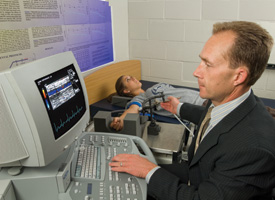
CHIP Principal Investigator Jeff Volek is disseminating nearly a decade’s worth of research on the effectiveness of low-carbohydrate diets through a well-received new book.
Volek, an associate professor of kinesiology in the Neag School of Education, co-authored The New Atkins for a New You: The Ultimate Diet for Shedding Weight and Feeling Great with two other researchers who, like himself, professionally study and personally follow the Atkins diet.
The book has appeared on the top of the London Times non-fiction best seller list and has been consistently in the top 15 of the New York Times Advice, How-To and Miscellaneous best seller list since it was released at the beginning of March. It also has received hundreds of favorable reviews on Amazon.com.
A number of features set the new book, published this spring, apart from previous Atkins books, including meal plans, recipes, tips for eating out and success stories. To Volek, however, the most important difference between his new Atkins book and previous Atkins books is the focus on sharing the emerging science behind the diet in such a way that readers can easily understand it and consistently apply it to their daily lives.
“Significant scientific discoveries have been made in the last eight years that could be described as paradigm shifting,” Volek explained. “We went to great lengths to simplify complex concepts and provide easy incremental action steps for readers. We wanted them to understand not only what to do, but why. The book is more flexible… Perhaps the most important aspect of the new book is that we address the critical issue of sustainability from both a nutritional and a behavioral perspective.”
The New Atkins for a New You compiles research from more than 50 scientific studies, including 20 articles Volek has authored since he began studying the safety and effectiveness of the Atkins diet and other low-carbohydrate diets in 2001.
Volek’s research has examined how low-carbohydrate diets affect weight loss, body composition and risk factors for metabolic syndrome, diabetes and heart disease. His team has measured dozens of different cardio-metabolic risk factors, including sophisticated analysis of different lipids, hormones, and inflammatory and oxidative stress markers, and consistently has found improvements. Specifically, his team has seen decreases in triglycerides, increases in HDL cholesterol, increased size of LDL particles, decreased glucose and insulin levels and decreased inflammation.
Among his more recent work in this field, Volek has addressed the issue of saturated fat on the Atkins diet.
“Despite consuming three times more saturated fat compared to a low-fat diet, saturated fat levels in the blood went down more than two-fold greater than with a low fat diet,” he said. “How? On Atkins, saturated fat becomes an important energy source so you burn both body fat and fat in the diet for fuel. Also, the body makes less saturated fat.
“What we have learned is that carbohydrates control the fate of saturated fat,” he said. “As long as carbs are low enough, the body processes saturated fat very efficiently. In the presence of an abundance of carbohydrates, saturated fat can be problematic.
“The key is finding the level of carbohydrate you can tolerate and then fat is your friend.”
One way Volek and his co-authors simplified the science behind the diet was with two new concepts: the Metabolic Bully and the Atkins Edge.
“Eating too many carbs acts like a bully cutting in line in front of fat to be burned,” Volek said.
“After a week or two on the Atkins diet, people’s bodies become extraordinary fat burners. That’s the Atkins Edge. But just one meal with a lot of carbs stops this process, and it can take up to another week to get the Edge back,” he said. “For most people, if they stay with the level of carb restriction in the Atkins induction phase, the carbohydrate metabolic bully is banished and major weight loss and overall health improvements are within their grasp.”
Volek’s co-authors are Dr. Eric C. Westman, an associate professor of medicine at Duke University Health System and director of the Duke Lifestyle Medicine Clinic, and Dr. Stephen D. Phinney, professor emeritus of medicine from the University of California at Davis.
This article was originally published July 14, 2010 on the UConn Center for Health, Intervention, and Prevention website.
 Facebook
Facebook
 Twitter
Twitter
 LinkedIn
LinkedIn
